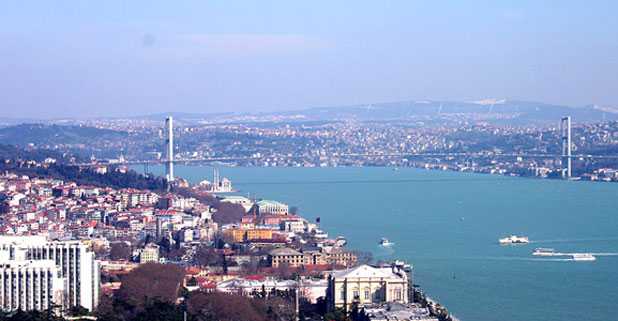Once a thriving port, Karaköy fell on hard times in the 20th century, and magnificent commercial edifices were divided into workshops. The opening of the nearby Istanbul Modern art gallery in 2004 sparked a renaissance that has gained momentum in the past couple of years. Now, hardware stores rub shoulders with galleries, restaurants and boutiques, creating a dynamic blend of urban grit and glitter. Hoping to cash in on this cachet is a swath of soon-to-open hotels, so Karaköy’s days as an “in-the-know” hideout may be numbered.
Istanbul’74
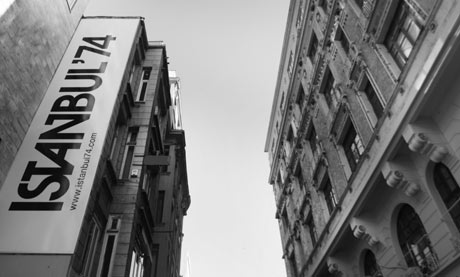 Power couple Demet Müftüoglu Eseli – long affiliated with Turkish luxury fashion label Vakko – and filmmaker Alphan Eseli established Istanbul’74, a thriving international arts and cultural platform, in late 2009. Headquartered at its art gallery and office in Karaköy, Istanbul’74 organises world-class exhibitions, workshops and festivals such as Istancool, each May. The latter has attracted luminaries such as Gore Vidal, Tilda Swinton and Zaha Hadid. Istanbul’74 itself has helped put Istanbul on the global artistic map, exhibiting works by Tracey Emin, Robin Rhode and Angel Otero.
Power couple Demet Müftüoglu Eseli – long affiliated with Turkish luxury fashion label Vakko – and filmmaker Alphan Eseli established Istanbul’74, a thriving international arts and cultural platform, in late 2009. Headquartered at its art gallery and office in Karaköy, Istanbul’74 organises world-class exhibitions, workshops and festivals such as Istancool, each May. The latter has attracted luminaries such as Gore Vidal, Tilda Swinton and Zaha Hadid. Istanbul’74 itself has helped put Istanbul on the global artistic map, exhibiting works by Tracey Emin, Robin Rhode and Angel Otero.
• Galata Sarap Iskelesi Sokak, Süha Fazlı Han 8/3, istanbul74.com, open Mon–Sat 10am-7pm
Kılıç Ali Pasa Hamam
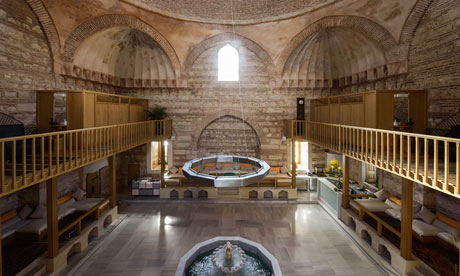 Designed by Mimar Sinan – architect to Suleiman the Magnificent – this hammam dates from the 1580s, and had fallen into ruin before it was saved by Ergin Iren, who devoted seven years to its meticulous restoration. It reopened in 2012 as a luxury hammam with an unexpectedly minimalist interior. After a revitalising bath, wrap up in fresh towels and rehydrate under the stunning 17-metre-high dome with a cool glass of sweet serbet.
Designed by Mimar Sinan – architect to Suleiman the Magnificent – this hammam dates from the 1580s, and had fallen into ruin before it was saved by Ergin Iren, who devoted seven years to its meticulous restoration. It reopened in 2012 as a luxury hammam with an unexpectedly minimalist interior. After a revitalising bath, wrap up in fresh towels and rehydrate under the stunning 17-metre-high dome with a cool glass of sweet serbet.
• Hamam Sokak 1, book in advance on +90 212 393 8010,kilicalipasahamami.com, entry is around £50pp, open daily, 8am-4.30pm (women), 4.30pm-midnight (men)
Karaköy Rooms
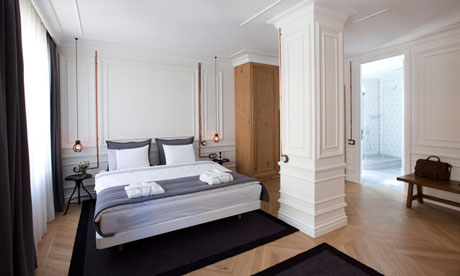 A boutique guesthouse with just nine bedrooms, Karaköy Rooms is in a renovated building upstairs from Karaköy Lokantası – one of Istanbul’s finest Turkish restaurants. Both are run by husband and wife team Aylin Okutan and Oral Kurt. The retro-styled rooms are elegant, rates are reasonable, and the traditional Turkish breakfast served downstairs is a snip.
A boutique guesthouse with just nine bedrooms, Karaköy Rooms is in a renovated building upstairs from Karaköy Lokantası – one of Istanbul’s finest Turkish restaurants. Both are run by husband and wife team Aylin Okutan and Oral Kurt. The retro-styled rooms are elegant, rates are reasonable, and the traditional Turkish breakfast served downstairs is a snip.
• Galata Sarap Iskelesi Sokak 10, +90 212 252 5422,karakoyrooms.com, doubles from £108
Elipsis
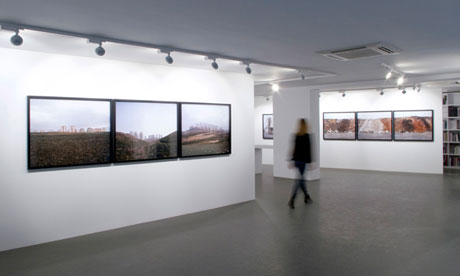 An ellipsis is the three dots (…) that follow an incomplete statement. Sinem Yoruk, the young and stylish founder of Elipsis, Istanbul’s only dedicated photography gallery, chose the name to reflect her desire to leave visitors speechless. Born and raised in London, Yoruk can date her passion for photography to her family’s professional photo lab. Founded in 2007, Elipsis moved to Karaköy in summer 2012, and represents both internationally renowned artists and emerging Turkish talents.
An ellipsis is the three dots (…) that follow an incomplete statement. Sinem Yoruk, the young and stylish founder of Elipsis, Istanbul’s only dedicated photography gallery, chose the name to reflect her desire to leave visitors speechless. Born and raised in London, Yoruk can date her passion for photography to her family’s professional photo lab. Founded in 2007, Elipsis moved to Karaköy in summer 2012, and represents both internationally renowned artists and emerging Turkish talents.
• Hoca Tahsin Sokak, Akce Han 10, elipsisgallery.com, open Tues-Fri 11am-6pm, Sat noon-6pm
Ops Cafe
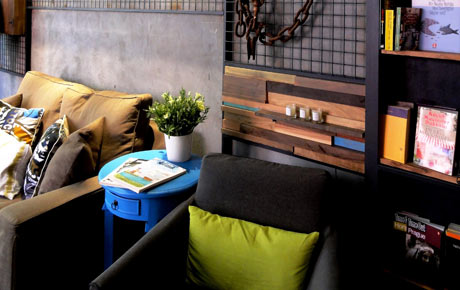 Nautical touches such as a hanging rope ladder and lanyard curtain ties reveal that the proprietor, Yasin Kalender, was a sea captain before opening this relaxed cafe last year. His wife, Esin, designed the interior, and named it Ops after the Roman goddess of plenty. The simple yet hearty menu includes a traditional Turkish breakfast, classic cafe fare and wines. All dishes prefaced by the “Ops” name feature the house speciality: delicious Albanian smoked beef.
Nautical touches such as a hanging rope ladder and lanyard curtain ties reveal that the proprietor, Yasin Kalender, was a sea captain before opening this relaxed cafe last year. His wife, Esin, designed the interior, and named it Ops after the Roman goddess of plenty. The simple yet hearty menu includes a traditional Turkish breakfast, classic cafe fare and wines. All dishes prefaced by the “Ops” name feature the house speciality: delicious Albanian smoked beef.
• Mumhane Caddesi Nimet han 45B, opscafekarakoy.com, mains £10, open Sun-Mon 8.30am-8pm, Tues-Sat 8.30am-10.30pm
Atölye 11
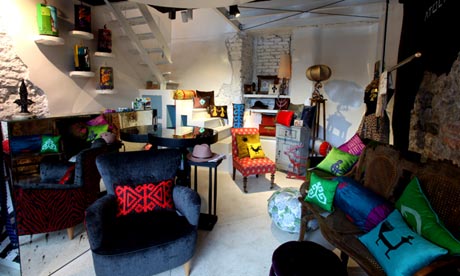 Located below the bell tower of the Turkish Orthodox church, this two-story boutique opened in December 2011, and sells a range of decorative objects, clothing and accessories by Turkish designers. Most popular are the embroidered silk cushions with Anatolian kilim motifs. Atölye 11 also sells Take Away Istanbul, a tongue-in-cheek line of souvenirs that includes Turkish tea glass, shot glasses and clever, Istanbul-inspired T-shirts.
Located below the bell tower of the Turkish Orthodox church, this two-story boutique opened in December 2011, and sells a range of decorative objects, clothing and accessories by Turkish designers. Most popular are the embroidered silk cushions with Anatolian kilim motifs. Atölye 11 also sells Take Away Istanbul, a tongue-in-cheek line of souvenirs that includes Turkish tea glass, shot glasses and clever, Istanbul-inspired T-shirts.
• Mumhane Caddesi 47, atolye11.com, open daily 10.30am-7pm
artSümer
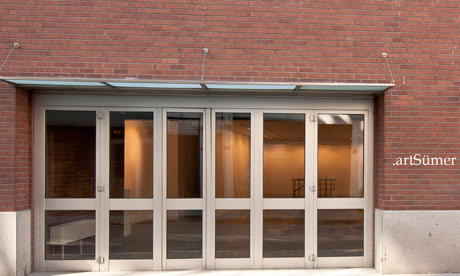 After founding artSümer in December 2004 on Istiklal Caddesi, Aslı Sümer moved her gallery to Karaköy in September 2011. A second-generation gallerist, Sümer fosters cutting-edge, Turkish artists who share her belief that art has the power to surprise and transform. The current astonishing site-specific installation by Gözde Ilkin runs until 30 March, followed by a show on antique dealers by Elif Öner in nearby Çukurcuma.
After founding artSümer in December 2004 on Istiklal Caddesi, Aslı Sümer moved her gallery to Karaköy in September 2011. A second-generation gallerist, Sümer fosters cutting-edge, Turkish artists who share her belief that art has the power to surprise and transform. The current astonishing site-specific installation by Gözde Ilkin runs until 30 March, followed by a show on antique dealers by Elif Öner in nearby Çukurcuma.
• Mumhane Caddesi, 67 Laroz Han, artsumer.com, open Tues-Sat 11am-7pm
Kagıthane
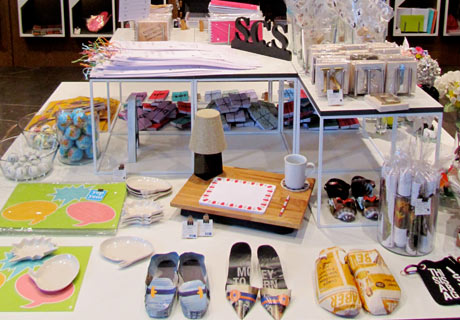 Located in the period French shopping arcade (Fransız Pasajı), Kagıthane shares a space with Bej, one of Karaköy’s first cafes. Meaning “house of paper”, Kagıthane is a concept store full of quirky paper objects and souvenirs inspired by Istanbul’s cats, street signs, fish and architecture. Established in 2011 by designer Emine Tusavul, the creative line includes coasters printed with traditional Turkish motifs, caricature postcards, and wrapping paper featuring sesame-encrustedsimit bread rolls and triangles of cream cheese.
Located in the period French shopping arcade (Fransız Pasajı), Kagıthane shares a space with Bej, one of Karaköy’s first cafes. Meaning “house of paper”, Kagıthane is a concept store full of quirky paper objects and souvenirs inspired by Istanbul’s cats, street signs, fish and architecture. Established in 2011 by designer Emine Tusavul, the creative line includes coasters printed with traditional Turkish motifs, caricature postcards, and wrapping paper featuring sesame-encrustedsimit bread rolls and triangles of cream cheese.
• Kemankes Caddesi 11, Fransız Is, kagithane.com.tr
Karabatak
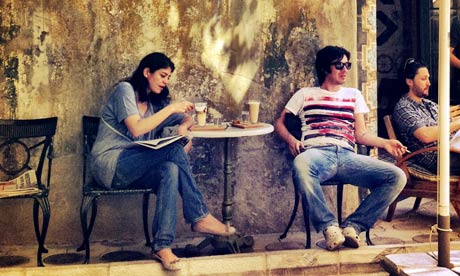 Named after the Bosphorus’s bobbing cormorants, Karaköy’s most popular cafe opened in June 2011. Julius Meinl, the Austrian coffee brand, created Karabatak as an office and hole-in-the-wall training cafe. Customers enjoyed Viennese coffee and cakes at extremely reasonable prices. Word quickly spread. The menu remains very limited (try the cappuccino-like weiner melange and the Sachertorte) but the space has grown. The vintage decor includes a converted tractor/bar. Upstairs is a quiet room with free Wi-Fi.
Named after the Bosphorus’s bobbing cormorants, Karaköy’s most popular cafe opened in June 2011. Julius Meinl, the Austrian coffee brand, created Karabatak as an office and hole-in-the-wall training cafe. Customers enjoyed Viennese coffee and cakes at extremely reasonable prices. Word quickly spread. The menu remains very limited (try the cappuccino-like weiner melange and the Sachertorte) but the space has grown. The vintage decor includes a converted tractor/bar. Upstairs is a quiet room with free Wi-Fi.
• Kara Ali Kaptan Sokak 7, karabatak.com, coffee £2-£3, open Mon-Fri 8.30am-10.30pm, Sat-Sun 9.30am-10.30pm
Unter
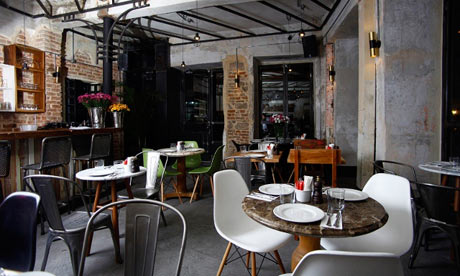 This cafe-bar opened in October 2012, serving hearty fare from Istanbul’s three favourite cuisines: Turkish (panfried liver and grilled octopus), Italian (prosciutto and lasagne), and American (mini burgers and pulled pork – a rare find in this city). With your stomach suitably lined, try Unter’s signature Bloody Mary or draft Turkish Tuborg Gold. Open late into the night, Unter attracts urban upmarket locals, and the top two floors often host arty after parties and private events.
This cafe-bar opened in October 2012, serving hearty fare from Istanbul’s three favourite cuisines: Turkish (panfried liver and grilled octopus), Italian (prosciutto and lasagne), and American (mini burgers and pulled pork – a rare find in this city). With your stomach suitably lined, try Unter’s signature Bloody Mary or draft Turkish Tuborg Gold. Open late into the night, Unter attracts urban upmarket locals, and the top two floors often host arty after parties and private events.
• Karaali Kaptan Sokak 4, +90 212 244 5151, unter.com.tr, mains from £10, open Tues-Thurs 11am-midnight, Fri 11am-2am, Sat 9am-2am, Sun 9am-8pm
https://www.theguardian.com/travel/2013/mar/22/istanbul-karakoy-top-10-cafes-shops-galleries

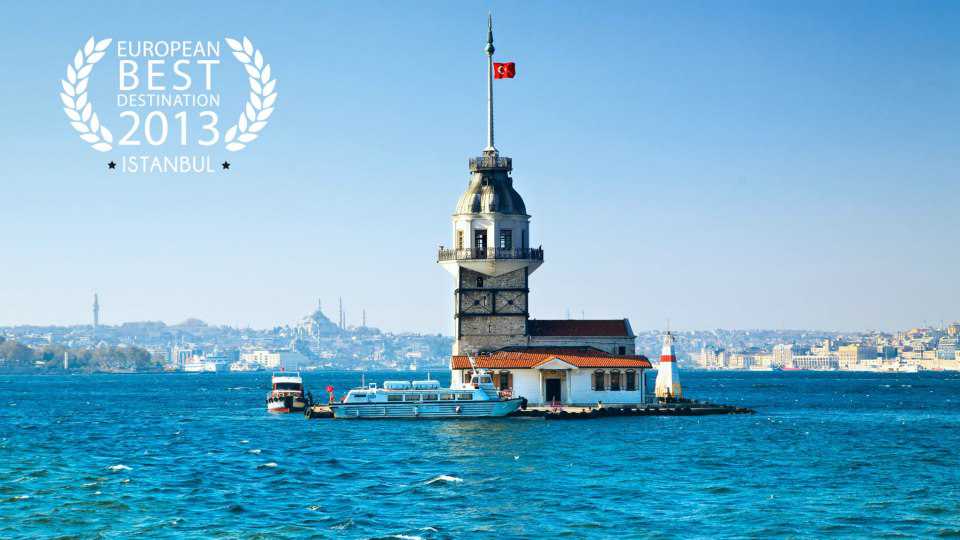

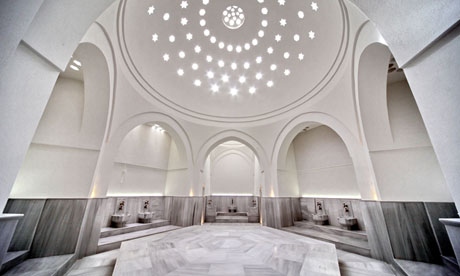
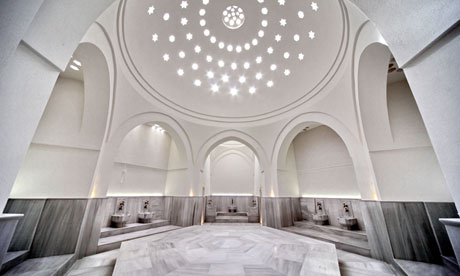

 Power couple Demet Müftüoglu Eseli – long affiliated with Turkish luxury fashion label Vakko – and filmmaker Alphan Eseli established Istanbul’74, a thriving international arts and cultural platform, in late 2009. Headquartered at its art gallery and office in Karaköy, Istanbul’74 organises world-class exhibitions, workshops and festivals such as Istancool, each May. The latter has attracted luminaries such as Gore Vidal, Tilda Swinton and Zaha Hadid. Istanbul’74 itself has helped put Istanbul on the global artistic map, exhibiting works by Tracey Emin, Robin Rhode and Angel Otero.
Power couple Demet Müftüoglu Eseli – long affiliated with Turkish luxury fashion label Vakko – and filmmaker Alphan Eseli established Istanbul’74, a thriving international arts and cultural platform, in late 2009. Headquartered at its art gallery and office in Karaköy, Istanbul’74 organises world-class exhibitions, workshops and festivals such as Istancool, each May. The latter has attracted luminaries such as Gore Vidal, Tilda Swinton and Zaha Hadid. Istanbul’74 itself has helped put Istanbul on the global artistic map, exhibiting works by Tracey Emin, Robin Rhode and Angel Otero. Designed by Mimar Sinan – architect to Suleiman the Magnificent – this hammam dates from the 1580s, and had fallen into ruin before it was saved by Ergin Iren, who devoted seven years to its meticulous restoration. It reopened in 2012 as a luxury hammam with an unexpectedly minimalist interior. After a revitalising bath, wrap up in fresh towels and rehydrate under the stunning 17-metre-high dome with a cool glass of sweet serbet.
Designed by Mimar Sinan – architect to Suleiman the Magnificent – this hammam dates from the 1580s, and had fallen into ruin before it was saved by Ergin Iren, who devoted seven years to its meticulous restoration. It reopened in 2012 as a luxury hammam with an unexpectedly minimalist interior. After a revitalising bath, wrap up in fresh towels and rehydrate under the stunning 17-metre-high dome with a cool glass of sweet serbet. A boutique guesthouse with just nine bedrooms, Karaköy Rooms is in a renovated building upstairs from Karaköy Lokantası – one of Istanbul’s finest Turkish restaurants. Both are run by husband and wife team Aylin Okutan and Oral Kurt. The retro-styled rooms are elegant, rates are reasonable, and the traditional Turkish breakfast served downstairs is a snip.
A boutique guesthouse with just nine bedrooms, Karaköy Rooms is in a renovated building upstairs from Karaköy Lokantası – one of Istanbul’s finest Turkish restaurants. Both are run by husband and wife team Aylin Okutan and Oral Kurt. The retro-styled rooms are elegant, rates are reasonable, and the traditional Turkish breakfast served downstairs is a snip. An ellipsis is the three dots (…) that follow an incomplete statement. Sinem Yoruk, the young and stylish founder of Elipsis, Istanbul’s only dedicated photography gallery, chose the name to reflect her desire to leave visitors speechless. Born and raised in London, Yoruk can date her passion for photography to her family’s professional photo lab. Founded in 2007, Elipsis moved to Karaköy in summer 2012, and represents both internationally renowned artists and emerging Turkish talents.
An ellipsis is the three dots (…) that follow an incomplete statement. Sinem Yoruk, the young and stylish founder of Elipsis, Istanbul’s only dedicated photography gallery, chose the name to reflect her desire to leave visitors speechless. Born and raised in London, Yoruk can date her passion for photography to her family’s professional photo lab. Founded in 2007, Elipsis moved to Karaköy in summer 2012, and represents both internationally renowned artists and emerging Turkish talents. Nautical touches such as a hanging rope ladder and lanyard curtain ties reveal that the proprietor, Yasin Kalender, was a sea captain before opening this relaxed cafe last year. His wife, Esin, designed the interior, and named it Ops after the Roman goddess of plenty. The simple yet hearty menu includes a traditional Turkish breakfast, classic cafe fare and wines. All dishes prefaced by the “Ops” name feature the house speciality: delicious Albanian smoked beef.
Nautical touches such as a hanging rope ladder and lanyard curtain ties reveal that the proprietor, Yasin Kalender, was a sea captain before opening this relaxed cafe last year. His wife, Esin, designed the interior, and named it Ops after the Roman goddess of plenty. The simple yet hearty menu includes a traditional Turkish breakfast, classic cafe fare and wines. All dishes prefaced by the “Ops” name feature the house speciality: delicious Albanian smoked beef. Located below the bell tower of the Turkish Orthodox church, this two-story boutique opened in December 2011, and sells a range of decorative objects, clothing and accessories by Turkish designers. Most popular are the embroidered silk cushions with Anatolian kilim motifs. Atölye 11 also sells Take Away Istanbul, a tongue-in-cheek line of souvenirs that includes Turkish tea glass, shot glasses and clever, Istanbul-inspired T-shirts.
Located below the bell tower of the Turkish Orthodox church, this two-story boutique opened in December 2011, and sells a range of decorative objects, clothing and accessories by Turkish designers. Most popular are the embroidered silk cushions with Anatolian kilim motifs. Atölye 11 also sells Take Away Istanbul, a tongue-in-cheek line of souvenirs that includes Turkish tea glass, shot glasses and clever, Istanbul-inspired T-shirts. After founding artSümer in December 2004 on Istiklal Caddesi, Aslı Sümer moved her gallery to Karaköy in September 2011. A second-generation gallerist, Sümer fosters cutting-edge, Turkish artists who share her belief that art has the power to surprise and transform. The current astonishing site-specific installation by Gözde Ilkin runs until 30 March, followed by a show on antique dealers by Elif Öner in nearby Çukurcuma.
After founding artSümer in December 2004 on Istiklal Caddesi, Aslı Sümer moved her gallery to Karaköy in September 2011. A second-generation gallerist, Sümer fosters cutting-edge, Turkish artists who share her belief that art has the power to surprise and transform. The current astonishing site-specific installation by Gözde Ilkin runs until 30 March, followed by a show on antique dealers by Elif Öner in nearby Çukurcuma. Located in the period French shopping arcade (Fransız Pasajı), Kagıthane shares a space with Bej, one of Karaköy’s first cafes. Meaning “house of paper”, Kagıthane is a concept store full of quirky paper objects and souvenirs inspired by Istanbul’s cats, street signs, fish and architecture. Established in 2011 by designer Emine Tusavul, the creative line includes coasters printed with traditional Turkish motifs, caricature postcards, and wrapping paper featuring sesame-encrustedsimit bread rolls and triangles of cream cheese.
Located in the period French shopping arcade (Fransız Pasajı), Kagıthane shares a space with Bej, one of Karaköy’s first cafes. Meaning “house of paper”, Kagıthane is a concept store full of quirky paper objects and souvenirs inspired by Istanbul’s cats, street signs, fish and architecture. Established in 2011 by designer Emine Tusavul, the creative line includes coasters printed with traditional Turkish motifs, caricature postcards, and wrapping paper featuring sesame-encrustedsimit bread rolls and triangles of cream cheese. Named after the Bosphorus’s bobbing cormorants, Karaköy’s most popular cafe opened in June 2011. Julius Meinl, the Austrian coffee brand, created Karabatak as an office and hole-in-the-wall training cafe. Customers enjoyed Viennese coffee and cakes at extremely reasonable prices. Word quickly spread. The menu remains very limited (try the cappuccino-like weiner melange and the Sachertorte) but the space has grown. The vintage decor includes a converted tractor/bar. Upstairs is a quiet room with free Wi-Fi.
Named after the Bosphorus’s bobbing cormorants, Karaköy’s most popular cafe opened in June 2011. Julius Meinl, the Austrian coffee brand, created Karabatak as an office and hole-in-the-wall training cafe. Customers enjoyed Viennese coffee and cakes at extremely reasonable prices. Word quickly spread. The menu remains very limited (try the cappuccino-like weiner melange and the Sachertorte) but the space has grown. The vintage decor includes a converted tractor/bar. Upstairs is a quiet room with free Wi-Fi. This cafe-bar opened in October 2012, serving hearty fare from Istanbul’s three favourite cuisines: Turkish (panfried liver and grilled octopus), Italian (prosciutto and lasagne), and American (mini burgers and pulled pork – a rare find in this city). With your stomach suitably lined, try Unter’s signature Bloody Mary or draft Turkish Tuborg Gold. Open late into the night, Unter attracts urban upmarket locals, and the top two floors often host arty after parties and private events.
This cafe-bar opened in October 2012, serving hearty fare from Istanbul’s three favourite cuisines: Turkish (panfried liver and grilled octopus), Italian (prosciutto and lasagne), and American (mini burgers and pulled pork – a rare find in this city). With your stomach suitably lined, try Unter’s signature Bloody Mary or draft Turkish Tuborg Gold. Open late into the night, Unter attracts urban upmarket locals, and the top two floors often host arty after parties and private events.

